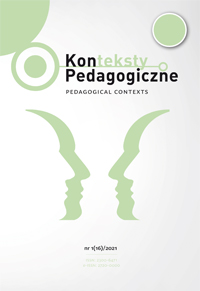Abstract
The article discusses the image of disabled people in movie culture. The focus is on the problem of disability. Although becoming more and more common, it is worth being researched no matter whether the universality of the presence of disabled people shows their true picture. The categories of dehumanization, the concept of role valorization and self-advocacy were used as the basis for considerations, which, in relation to the image of disabled people presented for the majority of Oscar-winning films, describe the evolution of this image.
References
Aronson, E., Wilson, T.D. i Akert, R.M. (1997). Psychologia społeczna. Serce i umysł, tłum. A. Bezwińska i in. Poznań: Zysk i S-ka.
Bełza, M. (2016). Ableism a zjawisko infrahumanizacji „obcych”. Teraźniejszość. Człowiek. Edukacja, 2(74), 77–87.
Bełza, M., Gajdzica, Z. i Prysak, D. (2017). (Nie)łatwe drogi wchodzenia w dorosłość przez osoby z niepełnosprawnością. Cieszyn: Wydawnictwo Arka.
Borowska-Beszta, B. (2012). Niepełnosprawność w kontekstach kulturowych i teoretycznych. Kraków: Oficyna Wydawnicza „Impuls”.
Chrzanowska, I. (2015). Pedagogika specjalna. Od tradycji do współczesności. Kraków: Oficyna Wydawnicza „Impuls”.
Cole, N.L. (2019). How Sociologists Define Culture, https://www.thoughtco.com/culture-definition-4135409 [dostęp: 12.02.2021].
Gajdzica, Z. (2011). Sytuacje trudne w opinii nauczycieli klas integracyjnych. Kraków– Katowice: Oficyna Wydawnicza „Impuls”–Uniwersytet Śląski.
Goffman, E. (2005). Piętno. Rozważania o zranionej tożsamości, tłum. A. Dzierżyńska. Gdańsk: GWP.
Goffman, E. (2007). Piętno. Rozważania o zranionej tożsamości, tłum. A. Dzierżyńska. Wyd. 2. Gdańsk: GWP.
van Dijk, T.A. (2001). Badania nad dyskursem. W: T.A. van Dijk (red.), Dyskurs jako struktura i proces (s. 9–44). Warszawa: PWN.
Haslam, N. (2006). Dehumanization: An Integrative Review. Personality and Social Psychology Review, 10, 3, 252–264.
Herskovits, M. (1948). Man and His Works: The Science of Cultural Anthropology. New York: Alfred A. Knopf.
Krause, A. (2009). Upośledzenie umysłowe, niepełnosprawność umysłowa czy niepełnosprawność intelektualna? Kontynuacja przerwanej dyskusji. W: M. Bielska-Łach (red.), Pedagogika specjalna. Różne poszukiwania – wspólna misja. Pamięci Profesora Jana Pańczyka (s. 63–70). Warszawa: Wydawnictwo Akademii Pedagogiki Specjalnej im. Marii Grzegorzewskiej.
Leyens, J.P., Paladino, P.M., Rodriguez, R.T., Vaes, J., Demoulin, S., Rodriguez, A.P. i Gaunt, R. (2000). The Emotional Side of Prejudice: The Attribution of Secondary Emotions to Ingroups and Outgroups. Personality and Social Psychology Review, 4(2), 186–197.
McCarthy, J. (2018). Rain Man at 30: Damaging stereotype or ‘the best thing that happened to autism’?, https://www.theguardian.com/film/2018/dec/13/rain-man-at-30-autism-hoffman-cruise-levinson [dostęp: 12.02.2021].
Momene, R. (2015). Negative stereotypes and attitudes linked to disability, https://atlascorps. org/negative-stereotypes-and-attitudes-linked-to-disability/ [dostęp: 12.02.2021].
Moyer, J. Wm. (2015). Welcome, Eddie Redmayne: Since ‘Rain Man’, majority of Best Actor Oscar winners played sick or disabled, https://www.washingtonpost.com/news/ morning-mix/wp/2015/02/23/since-rain-man-majority-of-best-actor-winners-played-sick-or-disabled/ [dostęp: 12.02.2021].
Ostrowska, A. (1994). Niepełnosprawni w społeczeństwie. Warszawa: Wydawnictwo IFiS PAN.
Prysak, D. (2015). Zredukowana dorosłość osób głębiej niepełnosprawnych intelektualnie. Wychowanie na co Dzień, 4(253), 26–32.
Pulrang, A. (2020). Disability Movies Aren’t What They Used To Be. That’s Good!, https:// www.forbes.com/sites/andrewpulrang/2020/02/13/disability-movies-arent-what-they-used-to-be-thats-good/?sh=4863ab225efa [dostęp: 12.02.2021].
Rzeźnicka-Krupa, J. (2019). Społeczne ontologie niepełnosprawności. Ciało, tożsamość, performatywność. Kraków: Oficyna Wydawnicza „Impuls”.
Söder, M. (1989). Disability as a Social Construct: The Labelling approach Revisited. European Journal of Special Needs Education, 4(2), 117–129.
Wojakowski, T. (2020). Wizerunek osób z niepełnosprawnościami: stan postulowany a rzeczywisty obraz w mediach odtworzony na przykładzie tygodników opiniotwórczych. Zoon Politicon, 11, 42–81.
In accordance with the recommendation of the Ministry of Science and Higher Education, which aims to counteract the practice of “ghostwriting” and “guest authorship,” all authors submitting their text for publication should attach an author’s statement which declares the contribution of each of the authors to the article. The printed and signed statement should be delivered by mail or other means to editor-in-chief Joanna Skibska or sent in the form of a scan to the following e-mail address: redakcja@kontekstypedagogczne.pl. The authors will not receive remuneration for publishing their papers. The editors reserve the right to make minor editorial changes to the articles which will not affect the substance of the article. We encourage all authors to prepare their articles in accordance with the guidelines for manuscript preparation. Download pdf file.
Authors transfer all copyrights and grant the journal the right of first publication with the work simultaneously licensed under a Creative Commons Attribution License that allows others to share the work with acknowledgement of the work's authorship and initial publication in this journal. All authors agree to the publishing of their email addresses, affiliations and short bio statements with their articles during the submission process.

